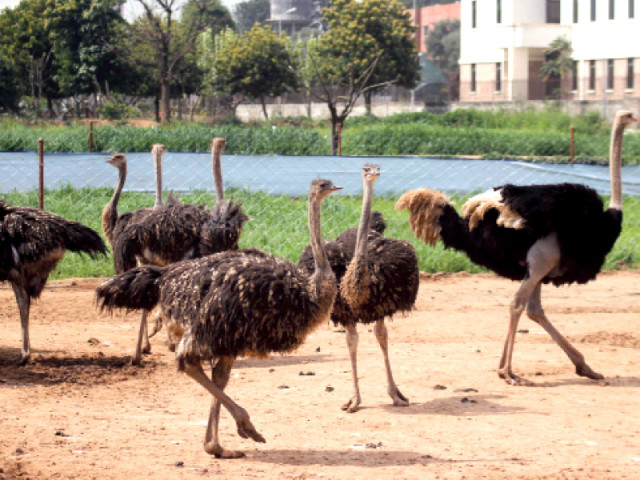Ostrich farming: At arid university, no venture is too ambitious
The project will be commercialised to generate revenue.

AAU’s team is hopeful ostrich farming will prove to be profitable. PHOTO: EXPRESS
In an enterprising move, that is sure to generate much-needed revenue, a team at the Arid Agriculture University (AAU) Rawalpindi, has started ostrich farming.
The varsity imported 10 ostriches and 50 chicks, which are now five months old. The project was started in September last year.
Speaking to The Express Tribune, Dr Nasir Mukhtar, in-charge Station for Ostrich Research and Development at AAU, said, “Ostrich farming is viable as it carries minimum risk of attracting disease unlike other poultry.” The price of a week old chick ranges between Rs12,000 to Rs15,000. Chicks have to be kept warm as the weather is too cool, he added.

An ostrich gains 100 kilogram (kg) in nine to 12 months and 130kg in one and a half year, said Dr Mukhtar.”A calf yields one kg meat after consuming 30kg fodder while an ostrich yields the same quantity after consuming five kg.”
A female ostrich gains sexual maturity in 18 to 20 months and begins laying eggs as compared to 30 months for the male, he said. “An ostrich lays 60 eggs twice a year – 30 eggs per season, summer and winter. Each egg weighs one kilogram and its incubation period is 45 days.” The male weighs comparatively more than the female, he added.
“Ostrich skin is in very high demand in the international market after crocodile skin and the government can help generate billions in revenue if farming is promoted at the national level.”
The climate of Potohar and Khyber-Pakhtunkhwa is perfect for ostrich farming, said Dr Mukhtar. “Ostriches are half-bird half-animal and have a strong immunity system which is why there are no vaccines for them. We vaccinate them against Newcastle disease as a preventive measure.”
There is no restriction on ostrich farming as the Punjab government declared it a farm animal in 2011. In other provinces, ostrich is considered wild animal private farming is banned, he added.

“The university has developed its own hatching and incubation facilities. This hatchery is solely for research. The university can train and support anyone interested in farming,” said AAU Vice-Chancellor Dr Rai Niaz.
Efforts will be made to farm ostriches for commercial gain and the revenue will be spent on awarding scholarships to talented and deserving students, he added.
Pakistan can fulfil its demand for meat through ostrich farming and can even export it, he said. “Ostrich meat is purely organic – there are multiple benefits.” We’ll soon import another 100 ostriches from Cameron, he added.
Dr Mukhtar said ostrich meat was not available in Pakistan and the university had received an offer from a chain of restaurants to provide the meat for Rs1,000 per kg, but their project was still research-oriented.
“In 1998, an initiative to farm ostriches was taken in Lahore, but it failed. Since then efforts have been under way and so far 5,000 ostriches have been imported.”
Published in The Express Tribune, March 22nd, 2014.



















COMMENTS
Comments are moderated and generally will be posted if they are on-topic and not abusive.
For more information, please see our Comments FAQ